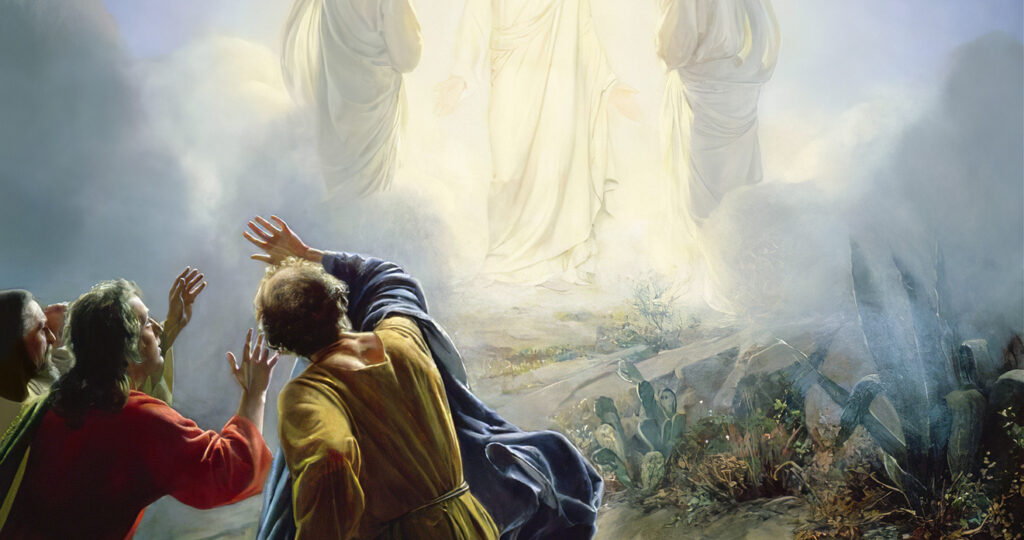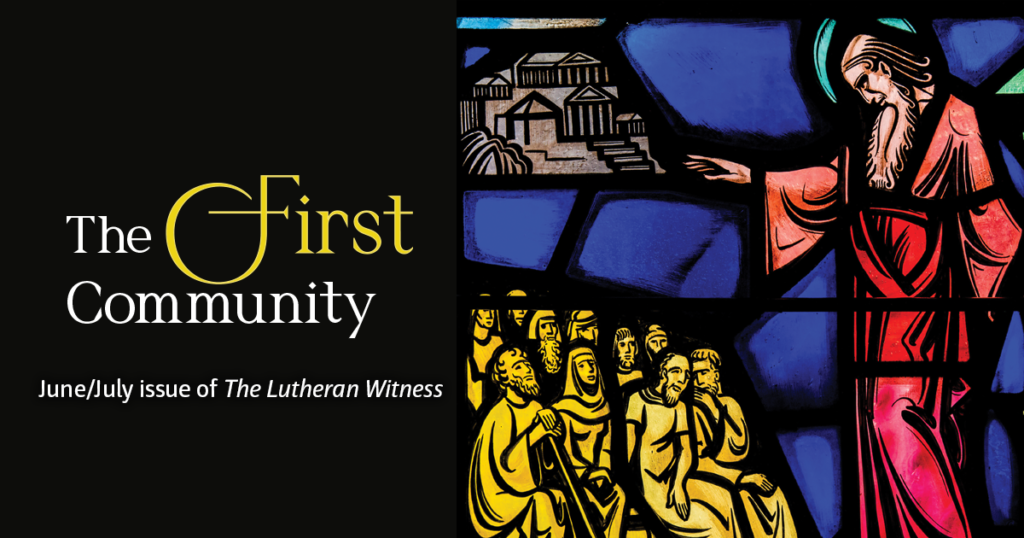By Kevin Golden
“And beginning with Moses and all the Prophets, [Jesus] interpreted to them in all the Scriptures the things concerning Himself” (Luke 24:27). On the day of His resurrection, as Luke records, Jesus joined two disciples as they walked from Jerusalem to Emmaus, opening their eyes to the full truth of God’s prophetic Word. Jesus used that two-hour journey to teach them — and Luke, and the growing first-century church, and even us — how to read the Old Testament rightly and in faith.
The whole of the Old Testament proclaims Christ and cannot be fully understood apart from its fulfillment in Christ. There are moments in Luke where this is readily evident, such as when, in Christ’s inaugural sermon at Nazareth, He reads from Isaiah 61 and then proclaims, “Today this Scripture has been fulfilled in your hearing” (Luke 4:21). There are also occasions when a major biblical narrative is obviously referenced. An example is Luke’s account of the Transfiguration, where Moses and Elijah are said to be speaking about Jesus’ exodus (Luke 9:31). While many translations opt for the term “departure,” Luke uses “exodus” as an unmistakable reference to the deliverance the Lord provided through Moses, which is now being accomplished in far greater fashion by Christ.
Yet Luke does not limit the fulfillment of the Old Testament in Christ merely to specific quotations and references. Throughout all his writings, Luke exemplifies Christ’s teaching on the road to Emmaus that every word of Scripture finds its fulfillment in Christ. Consider how Luke reports Christ’s ascension both in his Gospel and in the book of Acts. Before He ascends, Christ tells His disciples: “Behold, I am sending the promise of My Father upon you. But stay in the city until you are clothed with power from on high” (Luke 24:49). Luke includes similar words of instruction from Jesus in Acts: “You will receive power when the Holy Spirit has come upon you” (Acts 1:8). Both of Luke’s accounts refer to the outpouring of the Spirit upon the disciples at Pentecost as a direct fulfillment of Old Testament promises.
What promises are those? Jesus echoes the language of the prophet Isaiah, who announced a coming judgment that would remain “until the Spirit is poured upon us from on high” (Isaiah 32:15). That Jesus is the fulfillment of Isaiah’s prophetic word is not surprising. Yet when this specific passage from Isaiah is read in context, surprise awaits. Isaiah 32 concludes an extended prophecy of judgment against an idolatrous Jerusalem. While Isaiah proclaims that temporal judgment is coming, he also promises deliverance, using prophetic language regularly bound up with the last days: The king will rule in justice and righteousness (Isaiah 32:1). The wilderness will be a fruitful field, even the fruit of righteousness. The Lord’s people will dwell in peace, and the Spirit will be poured out from on high (Isaiah 32:15–18). The big surprise is this: Jesus is teaching that His ascension will usher in the last days.
This lesson was not lost on Luke and the first-century church. Intimately familiar with the Old Testament and guided by the Holy Spirit, they recognized not only the scriptural basis for Christ’s words but also their full meaning and practical implications.
This can be seen in three key ways in the Book of Acts. First, the apostles read the Old Testament Scriptures as proclaiming Christ. Consider Paul and Silas in Thessalonica and Berea. In Thessalonica, as was their normal practice, they taught from the Old Testament that the Christ must suffer and rise from the dead (Acts 17:2–3). When they brought this same message to Berea, the Bereans searched the Scriptures to verify their message (Acts 17:11). Having established that the Gospel message was in accord with the Old Testament, many of them believed. The Spirit worked through the Word to create and sustain faith.
Second, since the Old Testament finds its fulfillment in Christ, the church in Acts recognized a continuity between the faithful across the centuries. The faithful of old were saved by faith in Christ just as the faithful are saved by faith in Christ after the resurrection, as Peter proclaims in his Pentecost sermon. Twice Peter refers to David’s prophetic acknowledgment of Jesus as David’s “Lord” (Acts 2:34–36). Because Jesus is Lord and Savior for David and all the faithful of old, the first-century church confessed that there was no distinction between Jews and Gentiles, for both are saved by faith in Christ (Acts 15). Whether Jew or Gentile — whether living before the incarnation of Christ, during His earthly ministry or after His resurrection — all the faithful have the same focus: Christ. The Old Testament faithful looked toward His coming. The New Testament faithful looked back at Jesus’ ministry, death and resurrection, even as they looked forward to His return.
Third, Luke shows us in Acts that the last days have truly dawned upon us. What Christ taught at His ascension is echoed in Peter’s Pentecost sermon, which he begins by quoting the prophet Joel: “In the last days it shall be, God declares, that I will pour out My Spirit on all flesh” (Acts 2:17). Because they knew that the last days commenced when Jesus ascended, the first-century church lived in anticipation of Christ’s imminent return. Peter later stresses the bond between Jesus’ ascension and His return, when he says that heaven received Jesus “until the time for restoring all the things about which God spoke by the mouth of His holy prophets” (Acts 3:21).
As Luke and the first-century church learned from Christ, so do we. Still today, Moses and the prophets testify to us about Christ. In His grace, Christ has given us the Old Testament as a clear testimony to His salvation, and we remain one body with the Old Testament believers. It is often said that Pentecost marked the birth of the church. Yet that understanding fails to recognize the faithful of old as being part of the one true church. The church was born on the sixth day of creation when Adam and Eve were created. When we acknowledge this reality, it is easy to see and confess that we are living in the last days — as we have been for two millennia — waiting with eager longing for Christ’s return. And He will return. Luke confirms it by the angel’s words: “This Jesus, who was taken up from you into heaven, will come in the same way as you saw Him go into heaven” (Acts 1:11). Such certainty drove the first-century church to proclaim Christ boldly, and it continues to drive us today.

This article originally appeared in the June/July 2024 issue of The Lutheran Witness.




This excellent article fleshes out our belief that the entire Scripture, both the Old and the New Testaments, speak and teach of Jesus Christ, God’s only Son, anointed Messiah, and Savior of the world. I liked the precision which the article gives about the exact beginning of what we call the last days: When Jesus ascended to Heaven to return to His Father and His eternal home. Because where He is, we, His bride, shall also be, so it is just a matter of time before He returns to gather us up at The End, as Jesus clearly explained to His disciples in the Parable of the Tares and the Wheat. We know that at that time, He certainly will gather every forgiven and saved believer in Him who has ever lived on earth, from Adam and Eve to the very most recent person! Amen, even so, come Lord Jesus!
This was a very inspiring message indeed. Christ in the Old Testament, figuring prominently throughout the scriptures, something we should never ever overlook. And in our walk with the Lord in this fallen world of sin and chaos, do we still look upward, past the cynicism and unbelief of this age, to His return? I hope this is so. And as bad as these times of war and conflicts have beset the world stage, God is preparing the church for His return. The warnings of scripture announce it loud and clear, and even if the day and hour are concealed from us, we know that one day the sky will open up and He shall be revealed. This was the hope of generations before us, and our hope as well, and it is based on the sure promises of the Lord. The news is so dreadful these days, and fear and uncertainty rocks many hearts, yet there are reports which do not make the front pages, which are things we need to note as believers. The mission field is abuzz with millions coming to faith, in China, Africa, the Middle East, everywhere, because God’s plan cannot be thwarted by political turmoil, and human events. The Lord is coming. It will come to pass just as He said. Soli Deo Gloria